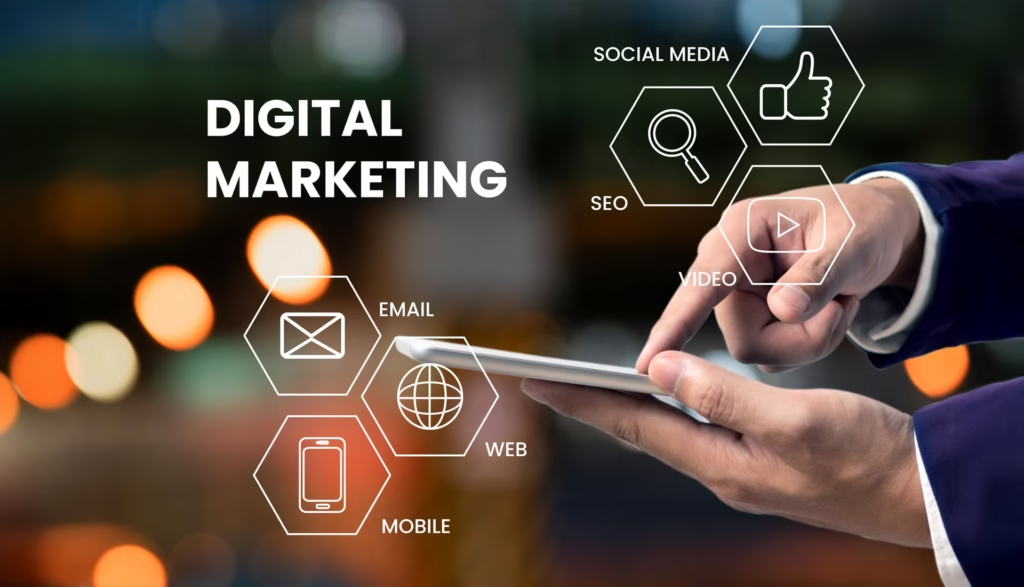In today’s competitive digital landscape, understanding web marketing has become essential for businesses of all sizes. Whether you’re a small startup or an established enterprise, mastering the art of online marketing can make the difference between thriving and merely surviving in the complex digital ecosystem.
Understanding Web Marketing: The Foundation of Digital Success
Web marketing, also referred to as website marketing, online marketing, or digital marketing, encompasses all promotional activities that occur on the internet. It’s the strategic use of digital channels, online platforms, and cutting-edge technologies to connect with current and prospective customers where they spend most of their time: online.
Think of web marketing as your business’s digital megaphone, allowing you to broadcast your message to millions of potential customers worldwide. Unlike traditional marketing methods that cast wide nets with limited targeting capabilities, business website marketing offers precision targeting, real-time analytics, and cost-effective solutions that can transform your business growth trajectory.
The evolution from keyword-based search to semantic search has revolutionized how businesses approach online marketing strategies. Modern search engines like Google now use natural language processing and artificial intelligence to understand user intent and contextual meaning behind search queries, making semantic SEO more critical than ever.
The Critical Importance of Web Marketing in Modern Business
The statistics speak volumes about why web marketing has become indispensable. With over 5.5 billion internet users globally, businesses that ignore digital marketing strategies risk becoming invisible to their target audience. Marketing web strategies have proven to deliver exceptional return on investment (ROI), with email marketing alone generating $42 for every dollar spent.
Web marketing experts understand that today’s consumers research products online before making purchasing decisions. They compare prices, read customer reviews, and seek recommendations through social media platforms. If your business isn’t actively participating in these digital conversations, you’re essentially handing your potential customers to competitors who understand the power of online marketing.
The beauty of web marketing lies in its measurability. Unlike traditional advertising, where you might wonder whether your billboard generated any sales, digital marketing provides detailed analytics and performance metrics showing exactly how many people saw your content, clicked your links, and converted into paying customers. This data-driven approach enables continuous optimization and campaign refinement.
Core Components of Effective Web Marketing
Search Engine Optimization (SEO): Your Digital Foundation
SEO forms the backbone of successful webmarketing strategies. It involves optimizing your website and content to rank higher in search engine results pages (SERPs). When someone searches for products or services related to your business, proper SEO ensures your website appears prominently in the results.
Effective SEO encompasses three main areas:
- On-page optimization: Keyword research, content optimization, meta descriptions, title tags, and website structure
- Off-page optimization: Building high-quality backlinks, link building, and establishing domain authority
- Technical optimization: Website speed, mobile responsiveness, structured data, and Core Web Vitals
Modern SEO now focuses heavily on semantic keywords and LSI keywords (Latent Semantic Indexing) that help search engines understand the topical authority and contextual relevance of your content. This semantic approach moves beyond simple keyword density to embrace natural language and comprehensive topic coverage.
Get noticed online with a powerful SEO service that drives traffic and boosts conversions.
Content Marketing: The Art of Digital Storytelling
Content marketing represents one of the most powerful tools in your web marketing arsenal. It involves creating and sharing valuable, relevant content designed to attract and engage your target audience. This content can include blog posts, videos, infographics, podcasts, social media posts, ebooks, and whitepapers.
Successful content marketing requires understanding your buyer personas and their customer journey from awareness to purchase. By providing helpful information at each stage, you build trust and establish your business as an industry authority. The key is creating high-quality content that addresses search intent and provides user value while naturally incorporating semantic keywords.
Social Media Marketing: Building Digital Communities
Social media marketing leverages platforms like Facebook, Instagram, LinkedIn, Twitter, and TikTok to connect with your audience on a personal level. It’s not just about posting content; it’s about fostering meaningful relationships and creating brand communities around your business.
Social media management involves consistent posting, engaging with followers, resomments and messages, and analyzing performance metrics to optimize your strategy continually. The rise of influencer marketing and user-generated content has made social media an even more powerful digital marketing channel.
Pay-Per-Click Advertising (PPC): Instant Visibility
PPC advertising offers immediate visibility for your business. Platforms like Google Ads and Facebook Ads allow you to display targeted advertisements to specific audiences based on demographics, interests, behaviors, and search intent.
The advantage of PPC lies in its precise targeting capabilities and measurable results. You only pay when someone clicks your ad, making it a cost-effective way to drive qualified traffic to your website. Conversion tracking and bid optimization ensure maximum campaign performance.
Email Marketing: Direct Customer Communication
Email marketing remains one of the highest-converting web marketing channels. It allows you to nurture leads, maintain customer relationships, and drive repeat business through personalized communication.
Effective email campaigns include welcome sequences, promotional offers, educational content, and customer retention programs. The key is providing value while maintaining consistent communication with your subscribers through segmentation and automation.
How to Do Web Marketing: A Strategic Approach
Understanding how to do web marketing effectively requires a systematic approach that aligns with your business objectives and target audience needs.
Step 1: Define Your Digital Marketing Goals
Before implementing any web marketing strategies, clearly define what you want to achieve. Common goals include:
- Increasing brand awareness
- Generating qualified leads
- Driving website traffic
- Boosting online sales
- Improving customer retention
- Enhancing user experience
Step 2: Identify Your Target Audience
Successful website marketing begins with understanding your ideal customers. Create detailed buyer personas that include demographics, pain points, preferences, and online behaviors. This information guides your content creation, platform selection, and messaging strategy.
Conduct thorough market research to understand your competitive landscape and identify opportunities for differentiation. User intent analysis helps you create content that matches what your audience is actually searching for.
Step 3: Choose the Right Digital Channels
Not every online marketing channel suits every business. B2B companies might focus on LinkedIn and email marketing, while B2C retailers might prioritize Instagram and Facebook advertising. Web marketing experts recommend starting with 2-3 channels and mastering them before expanding.
Consider factors like audience demographics, content consumption habits, and conversion potential when selecting channels. Multi-channel marketing approaches often yield the best results when properly coordinated.
Step 4: Create a Content Strategy
Develop a comprehensive content strategy that addresses your audience’s needs at different stages of their buying journey. Mix educational, entertaining, and promotional content to maintain audience engagement without being overly sales-focused.
Focus on creating topic clusters around your main semantic keywords to build topical authority. Use content mapping to ensure you’re addressing all aspects of your subject matter comprehensively.
Step 5: Implement Tracking and Analytics
Measure everything. Use tools like Google Analytics, social media insights, and email marketing metrics to track your performance. This data helps you understand what’s working, what isn’t, and where to allocate your resources for maximum impact.
Set up conversion tracking, goal funnels, and attribution modeling to understand the complete customer journey and optimize your marketing funnel accordingly.
The Business Website Marketing Advantage
Your website serves as your digital headquarters, making business website marketing crucial for online success. A well-optimized website acts as a 24/7 salesperson, providing information, building credibility, and converting visitors into customers.
Key elements of effective website marketing include:
- Mobile optimization: Ensuring your site performs flawlessly on all devices
- Page load speed: Optimizing for fast loading times to reduce bounce rates
- User experience (UX): Creating intuitive navigation and clear calls-to-action
- Conversion optimization: Testing and improving elements that drive visitor actions
- Schema markup: Helping search engines understand your content better
Working with Web Marketing Experts
While many businesses attempt DIY web marketing, working with experienced web marketing experts can accelerate your results significantly. Professional agencies bring specialized knowledge, advanced tools, and proven strategies that can save time and maximize ROI.
When choosing a digital marketing partner, look for:
- Proven track record with businesses similar to yours
- Transparent reporting and communication
- Comprehensive service offerings
- Understanding of your industry and target market
- Expertise in semantic SEO and modern digital marketing trends
At Mighty Musketeers, we specialize in helping small businesses and startups navigate the complex world of online marketing. Our team of certified digital marketing professionals understands the unique challenges faced by growing businesses and provides customized solutions that deliver measurable results.
Advanced Web Marketing Techniques
Semantic SEO and Natural Language Processing
Modern web marketing increasingly relies on semantic SEO principles. Instead of focusing solely on exact-match keywords, successful marketers now optimize for semantic keywords and related terms that help search engines understand content context and user intent.
Latent Semantic Indexing (LSI) keywords and co-occurrence patterns play crucial roles in contemporary SEO strategies. By incorporating semantically related terms naturally throughout your content, you signal to search engines that your content provides comprehensive coverage of the topic.
Voice Search Optimization
With the rise of voice assistants like Alexa, Siri, and Google Assistant, voice search optimization has become essential. Voice queries tend to be longer and more conversational, requiring optimization for long-tail keywords and natural language patterns.
Focus on question-based keywords and conversational phrases that people might speak rather than type. This approach aligns perfectly with semantic search principles and helps capture the growing voice search market.
Marketing Automation and Personalization
Marketing automation platforms enable sophisticated lead nurturing and customer segmentation. By automating repetitive tasks like email sequences, social media posting, and lead scoring, businesses can focus on strategy and creative development.
Personalization technologies use behavioral data and machine learning to deliver customized experiences to each visitor. This approach significantly improves conversion rates and customer satisfaction.
Common Web Marketing Challenges and Solutions
Challenge 1: Limited Budget
Many small businesses worry about the cost of web marketing. The solution lies in starting with cost-effective strategies like SEO, content marketing, and organic social media before investing in paid advertising.
Challenge 2: Time Constraints
Web marketing requires consistent effort and attention. Consider outsourcing to professional digital marketing services to maintain momentum while focusing on core business operations.
Challenge 3: Keeping Up with Algorithm Changes
Search engines frequently update their algorithms, affecting search rankings and visibility. Stay informed through industry publications, attend webinars, and work with experts who monitor changes and adapt strategies accordingly.
Challenge 4: Measuring ROI
Many businesses struggle to connect marketing activities with business results. Implement proper tracking systems and focus on metrics that directly correlate with your business goals, such as lead generation, conversion rates, and customer lifetime value.
The Future of Web Marketing
Web marketing continues evolving with emerging technologies like artificial intelligence, machine learning, augmented reality, and blockchain technology. Businesses that stay ahead of these trends and adapt their strategies accordingly will maintain competitive advantages.
Key trends shaping the future include:
- AI-powered personalization: Delivering tailored experiences based on user behavior and preferences
- Video content dominance: Leveraging short-form videos, live streaming, and interactive video for engagement
- Voice search optimization: Optimizing for voice queries and smart speakers
- Interactive content: Using polls, quizzes, and AR/VR experiences to boost engagement
- Privacy-focused marketing: Adapting to data privacy regulations and cookieless tracking
Measuring Web Marketing Success
Success in web marketing requires tracking the right key performance indicators (KPIs):
- Organic traffic and search visibility
- Conversion rates and lead generation
- Brand awareness and social media engagement
- Customer acquisition cost and lifetime value
- Email open rates and click-through rates
- Content engagement and time on page
Use tools like Google Analytics, Google Search Console, social media analytics, and marketing automation platforms to gather comprehensive performance data.
Last Say!
Web marketing isn’t just a business necessity—it’s your pathway to unlimited growth potential. By implementing comprehensive online marketing strategies that embrace semantic SEO, user intent optimization, and multi-channel approaches, you can reach new audiences, build lasting customer relationships, and achieve sustainable business growth.
Remember, successful web marketing requires patience, consistency, and continuous optimization. Start with clear goals, understand your audience, choose appropriate channels, and measure your results religiously. Whether you handle it internally or partner with experienced professionals, the key is taking action and staying committed to your digital marketing journey.
The digital landscape offers incredible opportunities for businesses willing to embrace web marketing. Your competitors are already online—the question isn’t whether you can afford to invest in web marketing, but whether you can afford not to. Start your digital transformation today and unlock the full potential of online business marketing for your company’s success.
Ready to transform your business with professional web marketing services? Contact Mighty Musketeers today for a comprehensive digital marketing strategy tailored to your unique business needs.












